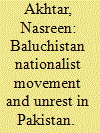| Srl | Item |
| 1 |
ID:
117909


|
|
|
|
|
| Publication |
2011.
|
| Summary/Abstract |
Pakistan is one of the most complex multi-ethnic societies in the developing Islamic world. Each of the ethnic groups that now comprise Pakistan has very distinctive identity, folklore, history and political interests. However, Pakistan's nation builders were not alive to the ethnic question and failed to integrate ethnic groups into a Pakistani nationhood through recognised principles of autonomy, representation and empowerment. Instead, a non-representative, military-led authoritarian system suppressed legitimate regional and ethnic aspirations, relying too heavily on Islam and Pakistan ideology (two nation theory) to forge a sense of common nationhood. It didn't work: since the 1950s there have been four major insurrections against the central government by Baluch nationalists. Although the Baluch national question has its roots in the colonial era, it emerged as a significant political and security issue because an over-centralised and non-representative power system couldn't address the issue of ethnic diversity. Baluchistan is now a hub of interests for regional and major powers.
|
|
|
|
|
|
|
|
|
|
|
|
|
|
|
|
| 2 |
ID:
180257


|
|
|
|
|
| Summary/Abstract |
Coup leaders often purport to restore constitutional order. During Burkina Faso's 2014 ‘insurrection', however, Blaise Compaoré's opponents advanced detailed (international) legal arguments that significantly constrained their subsequent conduct. Theirs was to be a legal revolution. This article situates this stance within Burkina Faso's distinctive history of urban protest, whilst emphasising under-analysed international sources for the insurrection. ‘Insurgent’ lawyers, it argues, used international instruments to reinvigorate longstanding activist attempts to reconcile constitutional rights with a language of popular justice promoted by the revolutionary regime of Thomas Sankara (1983–7). After the insurrection, however, their emphasis on legality was used by Compaoré's supporters to expose the transitional authorities’ double-standards. Meanwhile, insurgent lawyers working for the transition had to work hard to reconcile (international) legal justifications for the insurrection with the expedient politics needed to defend the new dispensation.
|
|
|
|
|
|
|
|
|
|
|
|
|
|
|
|